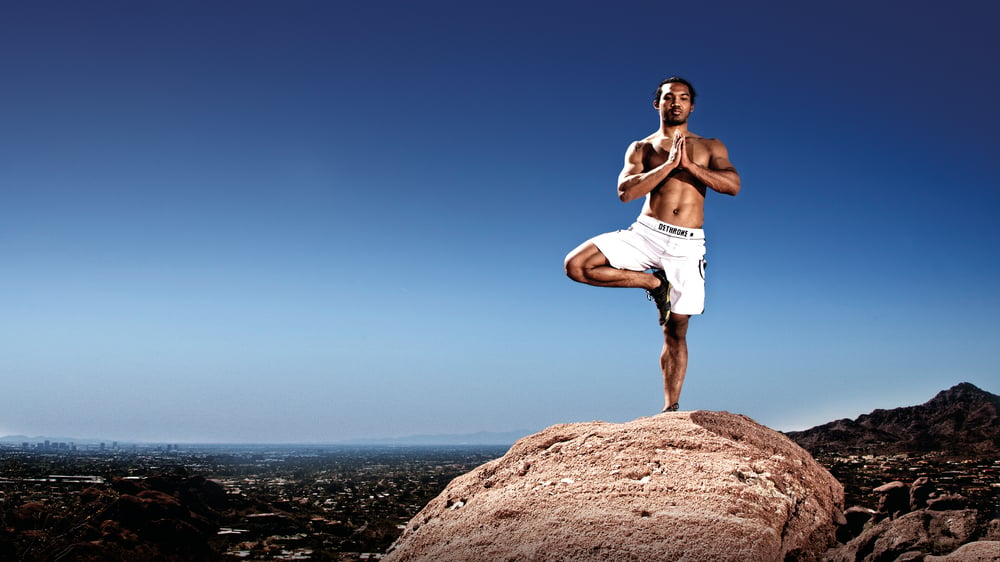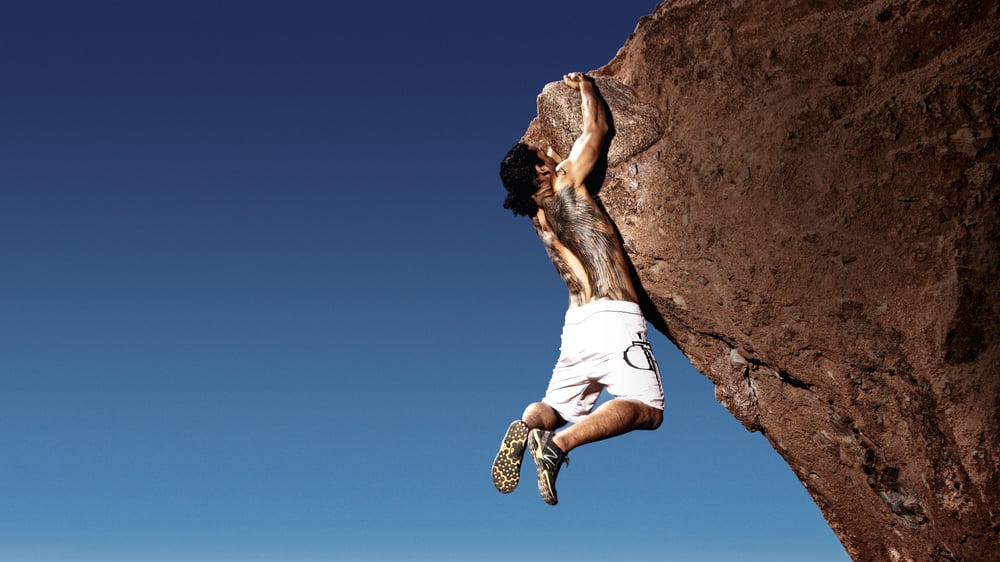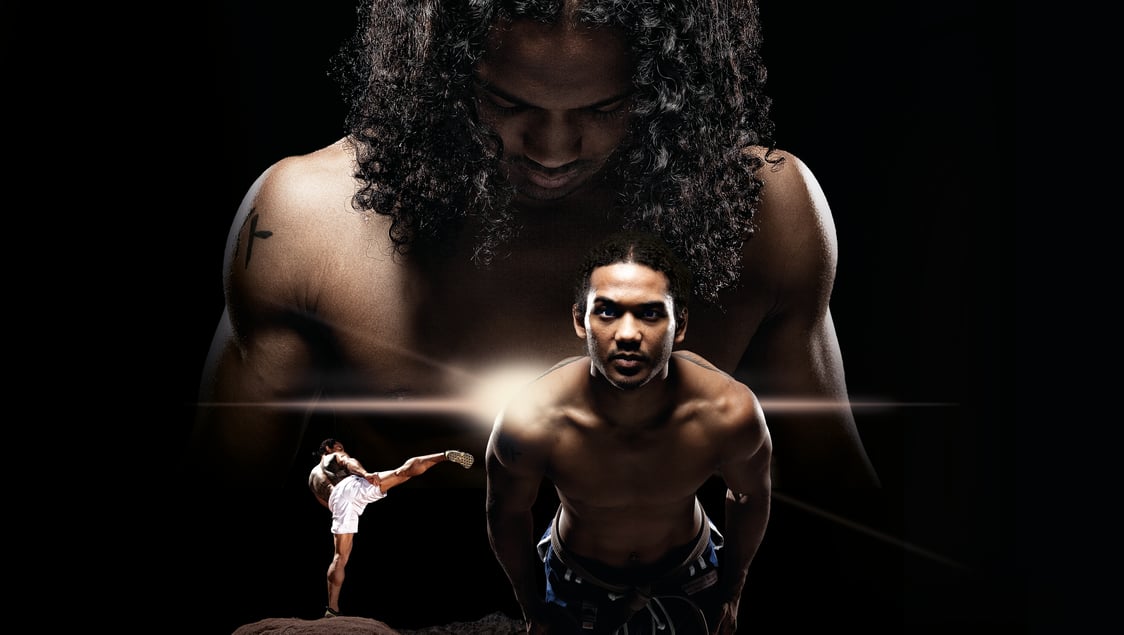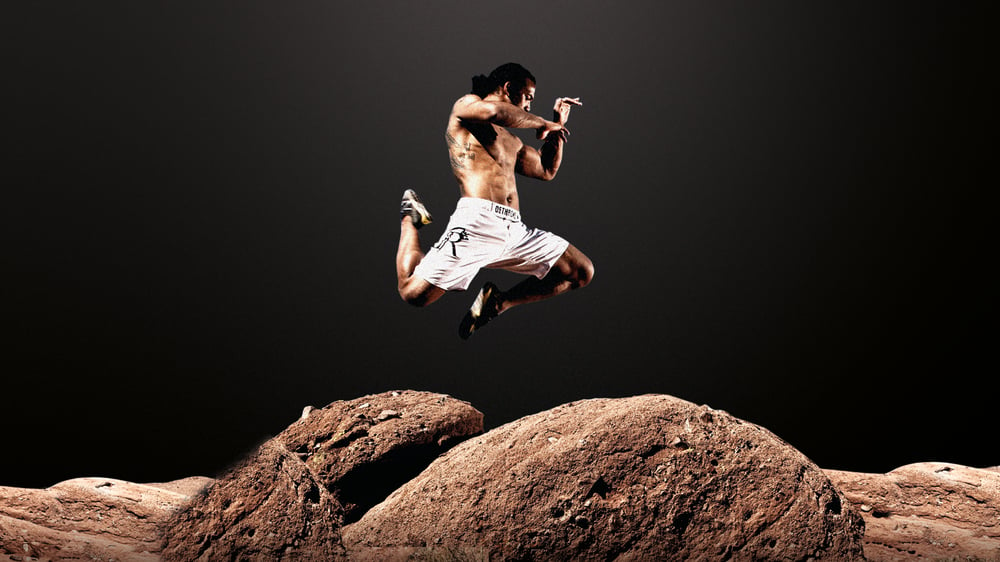
Issue 101
May 2013
Wholesome, gentle, spiritual, caring: Benson Henderson refuses to be typecast as one of the world’s greatest fighters – yet there is a hidden dark side to the UFC lightweight champion that’s driving him relentlessly towards a Hall of Fame legacy, writes Gareth A Davies.
Look deep into the eyes of Benson Henderson. Don’t be fooled by the disarming smile and the soft visage. The world through the eyes of this fighter is black and white, even according to those closest to him – his family.
The dark side of ‘hairy’ Henderson lies hidden alongside the tiny wooden toothpick sitting comfortably between the grit in his teeth. There’s no gray here. This is a warrior with a ruthless, win-at-all-costs, competitive spirit.
We have all witnessed the rise of the UFC lightweight champion, and once former WEC titleholder, over the last three years. He simply just keeps getting better. Since October 2009, Henderson has fought through
eight title fights. He may have lost once – to Anthony Pettis – but within his indefatigable, endless zeal he reckons they “will dance again” in this life.
While he’s kind, gentle, spiritual – Henderson reveals to Fighters Only a side to him that is unforgiving, meticulous and efficient. Nothing, it seems, is going to stop him chasing his legacy. When he’s not in camp he’s training to get better. He pushes himself to improve everywhere, all the time.
He disclosed that he’s not chasing fame and fortune, he even says he cares not a jot about the UFC belt. All he cares about is winning, and winning and winning. At everything. Even Monopoly, or tic-tac-toe; his nature is relentless.
It’s an incredible attitude, and one that comes across as a cold, singular frame of mind that can never rest. That’s not normal. It’s even a little frightening. Would you play him at Monopoly? I know I wouldn’t... If I did, I’d let him win.
What emerges is a blend of a man who is merciless, relentless and righteous, honed by a deeply supportive mother, a serious comic book addiction and the desire to leave it all in the Octagon in search of a lightweight legacy. Welcome to the dark side of Benson Henderson.

In the beginning
The current UFC lightweight champion dropped his life in Washington State to move across country to become all he could be, landing eventually in Phoenix, Arizona. For some time now, he’s gone about programming himself to become the greatest mixed martial artist in history. And nothing is going to stop him.
Aged 29 and now 20 fights into his MMA career (18 wins, two losses), Henderson has held both the WEC and, currently, UFC lightweight belts, yet remarkably, the first thing he gets into is the fact titles don’t really matter to him.
“Look, it’s nice to maybe have a higher pay check, maybe a little more notoriety, but really it doesn’t matter whether you have a belt or not. All that matters is you have to keep winning,” says Henderson, fresh from a morning yoga class in Glendale, Arizona.
“Besides the theatrics, the drama of it, it’s all just about winning. You have to win. Period. Whether it’s your UFC debut, whether it’s your fifth title defense, it doesn’t matter: if you lose, you lose.”
He adds: “Being famous, having the respect of your peers, it all comes with winning. All the rest of the stuff will come with time. All I’m concerned about is getting that hand raised.”
He’s always been this way, he recalls, even as a kid. “I was never concerned about being a cool kid or being popular. I wouldn’t say I was a dork, nor was I shunned. But I was always concerned about doing well in school.
“There were definitely a few times where I stuck up for some kids that were getting picked on and getting bullied or teased. At the same time, there were a few occasions where I didn’t step up and I didn’t say anything. Looking back, I wish I had. I wish I’d put my head on that chopping block. A few times I stayed quiet and I was sad that I did.”
Fighters’ paths to a combat arena often come through influences at a young age. Yet Henderson was never bullied, never fought his way out of the ghetto, never experienced gangs, or drugs, or violence.
The powerful influences on his life were his mother, who encouraged him to take up taekwondo aged 16, and his wrestling coaches at high school and college. “Absolutely I had influences. I had influences who made me the man I am today, but at the same time, they didn’t really make me a fighter. I stumbled into fighting. I never wanted to be a fighter. I never had any grand schemes to be a fighter. I just love to compete. The reason I’m a fighter, really, is just because I love to compete.
“I guess my influences are my mom, for the hard work ethic, and I guess that’s the main thing, that’s my biggest and favorite virtue – a hard work ethic. Someone who’s not afraid to go out there and bust their butt all day long and wake up the next day and do it all over again.
“Then there was my high school wrestling coach, and my college wrestling coach. Just seeing how hard they worked. Those two are probably my biggest influences on me being the man I am today.” They replaced an absent father, who wasn’t around much. “He was very in and out. He’d be in for like a month and he’d be gone for a few months, or a year then he’d be back for like a month, or two months. Then he’d be gone again, so no, he was not really around.”
Julius, Benson’s brother who is 18 months older, explained it all to Fighters Only in more detail: “My dad was in prison for a while. He recently got out and we don’t really have much to say. He was in and out of our lives and when he was there it was mostly a negative influence I guess so that’s just how it was. He was in (prison for) different things, I think drugs, and everything else that follows being addicted to drugs.”
Yet a father figure was important in young Benson’s life. “Not having a real father figure around full-time, I looked for a lot of other figures. The reason I loved my high school wrestling coach and my college wrestling coach was probably because they took the place of a father role for me. Them, and my uncle. Good guys, good men who were good examples.”
Win at all costs
Fast-forward a decade and we are watching an athlete- fighter with his own iconography. He tosses that mane of hair like others snap out a jab. Yet whilst most fighters change personality when they step into combat, Henderson insists there’s no ‘switch’ in him.
“A lot of guys tend to do that. I try not to do that. It’s not a separate person, it’s not another psyche, it’s not a darker side of me... it is me,” he says. “It’s the same guy who’s smiling, loves to play around, loves to read comic books – it’s the same guy inside that cage.”
Henderson does not buy into the need to be a Jekyll and Hyde character, and explains with chilling calm, almost like a well-rehearsed speech: “Some fighters say you need to be hungry, but what happens when you’re not hungry anymore? What happens when you have a fat pay check and you’re not hungry and you don’t want for anything... does your drive go away?
“What happens to those guys who need to be angry and they have disrespected their opponents? What happens when your opponent thinks you’re awesome, one of the best fighters ever, but he wants to beat your butt anyway? What happens then? What happens if you have no money, and you then make money? Do you lose your drive?
“I don’t fight for those reasons. I’m not that guy. I don’t have an ulterior, extra motive. I don’t need to compartmentalize myself in that way. It’s me inside the cage. I open my heart inside that cage, that’s what I do. I don’t fight ‘cos I’m hungry, I don’t fight ‘cos I need money, I don’t fight ‘cos my mom doesn’t love me, I don’t fight ‘cos I’m disrespected by an opponent and I hate his guts. In my opinion, those are the wrong reasons to fight. I fight because I love competition.”
And there lies the crux. Henderson has an iron will, a refusal to be beaten. It is what has turned him into a champion who is admired, but whose ambition to win at all costs makes him want to sit alongside Anderson Silva, Jon Jones and Georges St Pierre in the world’s elite club.
“What better form of competition is there than MMA?” Henderson goes on. “There is no better form of competition. It is pure, uncompromised competition. If you wanna hug the person, go ahead and hug them. If you want to kick the person, go ahead and kick them. If you wanna punch them, go ahead and punch them. You can do whatever you want to get your hand raised.
“I’ve opened up my heart showing the world how hard I’ve worked. Everything I’ve sacrificed, everything I did to get my hand raised – that’s what I love about MMA, that’s the reason I fight.
“I fight for the pure and simple thing that is pure, uncompromised competition. Plain and simple. There’s no balls, there’s no net, there’s no line. All it is, is one person versus one person, pure competition. That’s what I love.
“And... if you play me at chess, if you play me at tennis, you play me in tic-tac-toe, whatever it is. I wanna win, I need to win, I have to win. I don’t care if we’re playing Monopoly, I’m gonna kick your butt in Monopoly.
“People have passions in life. For me, a passion of mine is competition. Whatever it is, it could be rock climbing; I’ll climb to the top of a mountain faster than you. It could be a race; if you beat me the first time, I’ll beat you the second time.
“I don’t need to be hurt, I don’t need to be poor. I don’t need to be any of these things to be a great fighter. I do it, I think, for the right reasons. Just for the simple case of love of competition.”

Back to the future
Apart from an anaconda submission loss to Rocky Johnson in his third pro fight, the only career defeat suffered by Henderson was to Anthony Pettis. Now writ large as his rival heads to featherweight and a date with champion José Aldo in his emerging UFC career.
The Pettis fight, lost on a unanimous decision, featured ‘that kick,’ of course. The ‘Showtime’ kick off the cage which floored Henderson and was then flashed around the world a million times in sports highlight reels. Not for the first time, a rematch plays out in his mind.
“Before I retire from MMA, Anthony Pettis and I will dance again. And I’m gonna have fun. I’m gonna enjoy it,” Henderson says with a smile. “I’m not burdened by the past. I lost to Anthony Pettis, but I was able to move on. I don’t live three years in the past. It helps you in life as a person not always to be stuck in the past. You have to move forward, you have to look forward.” There’s that ruthless streak again.
Outside the confines of the gym, and close friends, Henderson has an interesting take on the world. But some things do upset him. He adds: “I’m pretty laid back, but I guess the biggest thing for me on a grander scale is a macro look at the world, and the fact there’s a lot of social injustice in society.
“It’s so engrained. As human beings we are evolved enough, we are far enough along in our evolution that we should not have social injustice on this planet no matter what society we’re in. That makes me upset. That makes me angry.”
Probing deeper, the spirit in Henderson believes having a mission is inevitable. “I would like to think I’m here for a reason,” he states categorically. “Everyone on this planet, we are all here for a reason. We are all here to impact on somebody else.
“Whether we’re five years old and we made a friend, and it changed their lives, or whether you’re 16 and you get the first love of your life, and because of the way you treated that person they’re going to now treat the rest of their relationships that much better.
“I think my reasons haven’t even got started yet. Along the way, I think hopefully I’ll be put on a bigger stage, under a bigger spotlight so I can be a good example and inspire people to make better choices.”
Entertainment vs. competition
Henderson has also given up defending mixed martial arts to the naysayers. “I wouldn’t lie,” he states, “but I don’t really care! It doesn’t matter to me no more. Everyone’s going to have their own opinion. Some people don’t like soccer, or football. That’s cool. You don’t have to like soccer. Some people don’t like boxing; they think boxing is terrible. No problem, that’s your opinion.”
What does matter to him, though, are the Eastern values in martial arts. “I try to put out the traditional martial arts aspect of MMA. Yes, it is a fight but in traditional martial arts you’re always trying to improve yourself, have self-control, self-discipline, push your boundaries, push your limits.
“Those aspects of traditional martial arts are downplayed in the UFC but they are very important aspects to me.” Those words ring true in the way Henderson carries himself, as a fighter, athlete, martial artist... and popular entertainer?
“Honestly, this is sports entertainment, yes; a little bit of a business. So you do want to be well-liked, you do want to be popular, you want the fans to like you and stuff.”
Yet that ruthless vein in him keeps him grounded. “Some fighters put it at the forefront, and they want to be popular and famous and well-liked first, and then they worry about the ring second,” he adds.
“Me? I wanna win first then I’ll worry about being well-liked.” There are parallels here with Cable, the comic book hero of his childhood, who steps up when he faces his foes. Henderson thinks again. Now he is Cable.
“That was exactly what Cable did – he had his missions, he had to do his duties, and he was a soldier, he went out and did it. He made the hard choices but that was what he was best at.
“Not everyone’s going to like you, period. No matter what. You can be one of the best soccer players of all time – yet there are guys who still dislike you. You can be David Beckham, some guys say he’s super-overrated. You’re always going to have people who don’t like you for whatever reason.
“I don’t really concern myself with that. It’s nice to be well-liked, to be popular, but I worry about winning first. Then everything else falls into place.”
...










